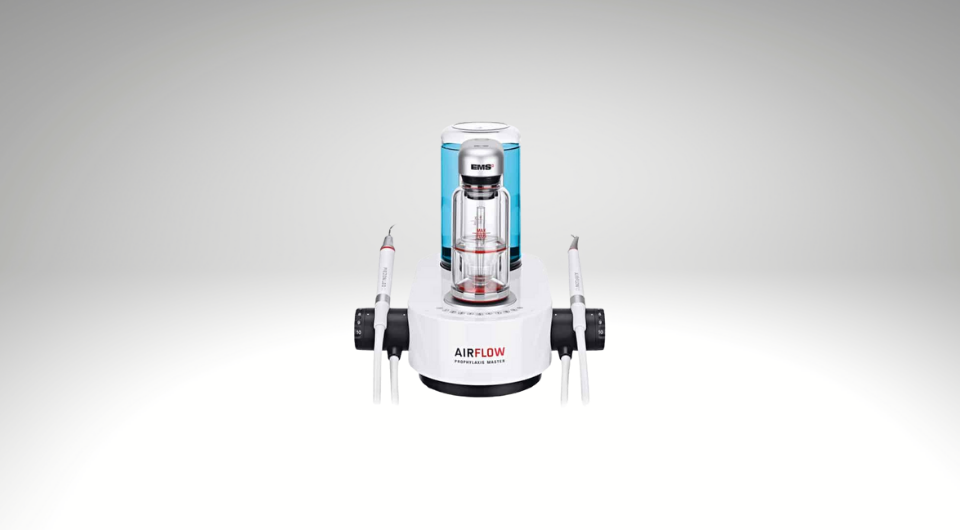
Posted on: 09 February, 2024
Visiting the dentist for a regular check-up and hygiene treatments is important for maintaining good oral health. But if you have sensitive teeth or gums, traditional cleaning methods may be uncomfortable. Guided biofilm therapy (GBT) is a modern technique that involves less contact with the teeth, reducing discomfort while still removing plaque effectively.
3 minute read
At Mount Lawley Dental in Mount Lawley, we offer guided biofilm therapy using EMS Airflow technology. Find out more about what this process involves and what to expect during your regular check-up and clean.

Oral biofilm is bacteria that builds up in the mouth. This includes plaque – a sticky, yellow layer of bacteria that can build up on the teeth and around the gum line, which causes problems such as tooth decay and gum disease.
Good brushing and flossing habits help to reduce the growth of plaque, but they can't remove all biofilm, especially if it hardens into calculus (tartar). This can only be removed during professional dental cleans. Enquire about an airflow clean today!

Guided biofilm therapy (GBT) is a new clinical protocol developed by Swiss medical company EMS in collaboration with leading dentists and universities. This approach uses water, air and a special powder to clean and polish teeth during routine dental visits.
GBT reduces contact with the teeth compared to other cleaning and polishing techniques that use traditional hand instruments, ultrasonic devices or brushes. However, depending on the individual, traditional instruments may still be necessary to remove more stubborn calculus deposits.
EMS Airflow guided biofilm therapy was developed through years of clinical research to be a fast, painless and minimally invasive alternative to traditional teeth cleaning.
This can make routine teeth cleaning more comfortable, especially for people with sensitive teeth or gums, as you will only feel the gentle contact of air and water.
GBT can also help people with dental anxiety or a fear of dentistry to feel less nervous about their appointments and less likely to delay or avoid hygiene maintenance, which could put their oral health at risk. Book your next hygiene maintenance appointment using Airflow.
Oral hygiene treatments using EMS Airflow guided biofilm therapy are personalised for the needs of the individual. Your dentist or hygienist will explain each of the steps involved so you know what to expect.
Before cleaning, your dentist will examine your teeth for signs of plaque and other issues to determine whether you are a candidate for guided biofilm therapy or if you may need a more intensive treatment.
Your dentist will apply a temporary dye that makes plaque deposits on your teeth visible. This helps to ensure complete removal of biofilm from their surface.
Using EMS Airflow instruments, your dentist will then remove plaque and early calculus deposits from your teeth by applying a gentle jet of air and warm water.
If your teeth have surface stains or discolouration, these may be removed or reduced by applying a light powder during the cleaning process.
After removing sticky plaque, your dentist will gently remove any hard calculus deposits. If there is more severe calculus build-up, EMS Airflow may need to be combined with traditional hand instruments.
After removing biofilm from your teeth, your dentist will gently clean deep inside the periodontal pockets. This removes bacteria from beneath the gums to help prevent gum disease.
After cleaning is complete, your dentist will check that biofilm and discolouration have been successfully removed. They will then apply a fluoride coating to your teeth to help prevent further plaque build-up.
Your dentist may offer advice or guidance on how to improve your oral hygiene routine at home. They will then schedule your next appointment based on your individual needs.
Your dentist can only do so much to lower your oral health risks. To prevent tooth decay, gum disease and other problems, it's also important to follow good oral hygiene habits in your daily life. This includes:
For most people, dentists recommend brushing your teeth twice a day – preferably early in the morning and before going to bed.
Brushing should take around 2 minutes, cleaning the inside, outside and chewing surfaces of your teeth. Use fluoride toothpaste and a soft-bristled toothbrush to avoid damaging your teeth.
If you have sensitive teeth and gums, your dentist can recommend a desensitising toothpaste and other dental products to help you.
Flossing at least once a day is important for cleaning the areas between your teeth that your toothbrush can't reach.
If you find traditional floss uncomfortable, your dentist may suggest alternatives such as interdental brushes or water flossers for a gentler clean.
Sugar feeds bacteria in plaque, which leads to tooth decay and other problems. Check the sugar content of food and drink you buy or avoid sugary snacks, soft drinks and fruit juices to lower your risks.
Drinking plenty of water helps to rinse your mouth and protect your teeth, especially if you're drinking fluoridated tap water.
Following a balanced and nutritious diet is important to support your oral health and overall health.
If you're due for a check-up and you have sensitive teeth, our dentists at Mount Lawley Dental offer gentle and painless cleans using EMS Airflow guided biofilm therapy.
To book an appointment or find out more, call our friendly team today on (08) 9227 8777 or book online.